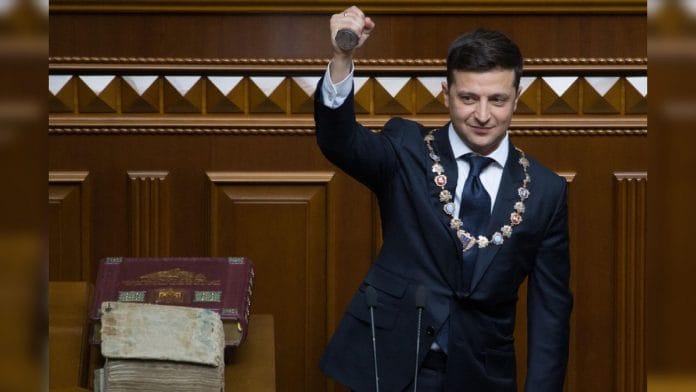To gain popular appeal among voters, political elites routinely cast themselves in the role of a servant leader — that is, someone who sets aside self-interest in favour of serving others. For the servant leader, the office they occupy is not intended to capture and maintain power, but rather to advance the interests of the constituents they serve.
There’s no better example of this at the moment than Ukrainian president Volodymyr Zelensky.
The English-language interpreter for Ukrainian President Volodymyr Zelensky’s speech to European lawmakers on Tuesday was so moved by the remarks that he momentarily lost his composure. https://t.co/j995BZwUJY
— The Washington Post (@washingtonpost) March 1, 2022
His commitment to Ukraine and Ukrainians is at odds with many recent examples from across the ideological spectrum of political elites claiming to function as servant leaders while exhibiting wholly contradictory behaviours.
Take California Gov. Gavin Newsom’s decision to attend a group dinner at the tony French Laundry restaurant in the Napa Valley during the height of the COVID-19 pandemic, when he was advising his state’s residents to stay home as a public health precaution. Or British Prime Minister Boris Johnson’s attendance at a party when the country was under a stay-at-home order.
These examples suggest that although they may claim otherwise, political leaders consider themselves to be part of a distinct, elite class for whom the rules that govern ordinary citizens do not apply. Indeed, their behaviour is predicated on the underlying belief that constituents ought to do as leaders say and not as they do.
Also read: Why’s Ukraine President Zelenskyy a winner? Watch TV comedy ‘Servant of the People’ for answer
Courage of his convictions
Not so for Zelensky, who’s captured the admiration of the world in large part by aligning his rhetoric with his actions during the Russian invasion of his country.
Comparing Zelensky’s words with his conduct in recent years shows how he’s the quintessential servant leader even under the most precarious of circumstances.
In May 2019, in his inaugural address after being elected president, Zelensky alluded to the importance of political office-holders performing as servant leaders. Under his leadership, he hoped to establish Ukraine as a country where, in his words:
“Everybody is equal before the law and where the rules of the game are honest and transparent [and] are the same for everyone. And for this to happen, people who want to serve the nation need to take office.”
While political leaders often make such lofty claims, rarely are they practised through their actions.
When Vladimir Putin ordered the invasion of Ukraine, his intention was clear: to overthrow Zelensky’s democratically elected government and establish a puppet regime in favour of the Kremlin. With this objective in mind, the Russian military set its sight on Kyiv, and Zelensky immediately became “Target No. 1.”
In a show of moral fortitude and unwavering courage, Zelensky refused to flee Kyiv. As the violence crept closer to the capital in the days that followed, and with Zelensky’s life under threat, U.S. President Joe Biden offered to evacuate him from Ukraine. Rejecting the offer, the Ukrainian president responded with his now famous line: “I need ammunition, not a ride.”
Placing himself at risk
Zelensky’s decision to remain in Kyiv is both exceptional and profound. There are few recent examples of political elites willing to put themselves at risk personally for the collective good — Abraham Lincoln, Nelson Mandela and Mother Teresa are some servant leaders of the past. His decision exemplifies the spirit of servant leadership.
Zelensky has asked Ukrainian men and women to confront the invaders and to defend their country. In a last-ditch attempt to dissuade Putin on the eve of the invasion, he said: “When you attack us, you will see our faces, not our backs.”
Consistent with servant leaders who relegate their own self-interest in order to protect the interests of the people they serve, Zelensky stayed put to be part of the country’s resistance. He asked nothing of citizens that he wasn’t determined to do himself.
To be sure, many ordinary Ukrainians have heeded the call to defend their country against the invasion from the military superpower. Their individual and collective heroism should not be negated.
But for the citizenry’s resolve to resist and persevere against the Russian occupation, it’s critical to have a political leader who is standing alongside the people, serving them in leading by example. During the country’s darkest hours, Zelensky has shown himself a man for the people, of the people — not just in rhetoric, but more importantly, in action.
The Russian invasion of Ukraine continues. While the Ukrainian president’s fate remains uncertain, one outcome is clear: Zelensky’s embodiment as a servant leader during this time of crisis means he will either live on as a hero or die a martyr. He has shown the world what it means to be a leader whose foremost commitment is to the citizens he serves.
Ajnesh Prasad, Canada Research Chair, Royal Roads University
This article is republished from The Conversation under a Creative Commons license. Read the original article.
Also read: Ex-comic, war-time leader, Putin’s ‘target No. 1’ — Who is Ukraine President Volodymyr Zelenskyy






